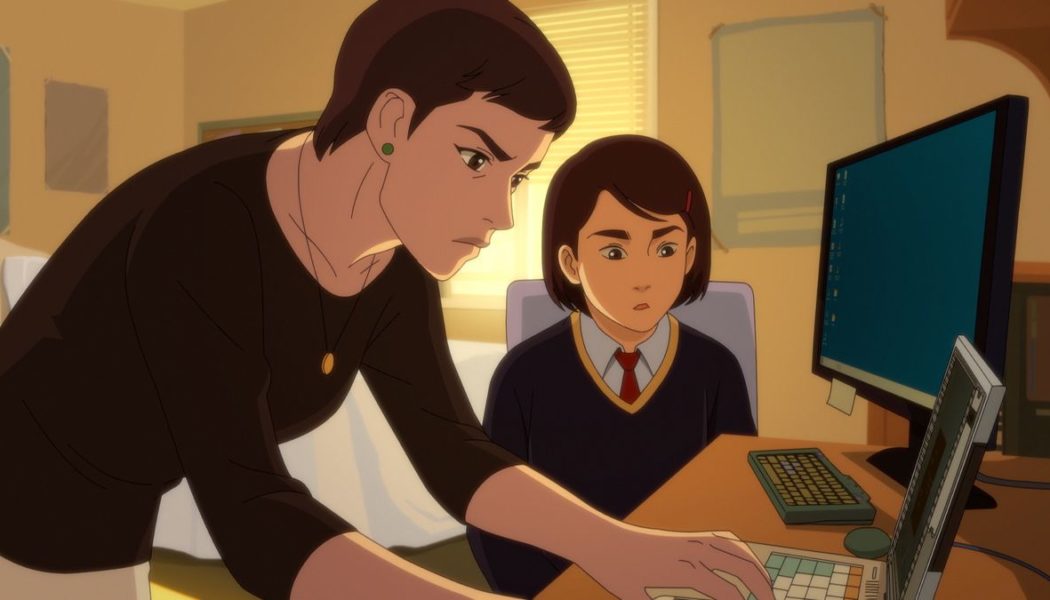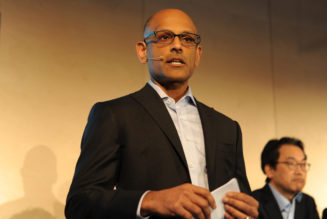In a less stressful world, the premise of AMC’s new animated series Pantheon from Craig Silverstein would feel much more far-fetched and implausible the way some of Black Mirror’s more fantastical episodes used to. But at a time when people use phrases like “quiet quitting” with a straight face, a show about corporations racing to see who can perfect technology to turn workers into hyperproductive automatons stripped of their humanity feels far less fictional than it ought to.
Pantheon tells a series of interconnecting narratives set in a near-future world not unlike our own, but its story largely revolves around a teenager named Maddie (Katie Chang) and her mother Ellen (Rosemarie DeWitt) as the pair struggle to cope with a tragedy. Though Maddie understood how serious her father David’s (Daniel Dae Kim) battle with a terminal illness was, the shock of his death still sends her into an emotional spiral that makes it hard for her to be present or empathetic to her mother’s pain. Like her daughter, Ellen’s feelings about David’s death are complicated and difficult to put into words, but she understands that moving on is something she has to do for her own healing.
Because David’s death is so relatively recent as Pantheon opens, neither Ellen nor Maddie really feel as though they can open up to one another about their feelings or where they’re at mentally. But all of that changes one fateful afternoon when Maddie receives a mysterious message written in emoji that somehow manages to pop up in her command line interface, of all places.
:no_upscale()/cdn.vox-cdn.com/uploads/chorus_asset/file/23989691/PAN_101_0011_RT.jpeg)
While Ellen and David raised Maddie to be tech-savvy and careful about how she engages with people she meets online, she can’t help but vent her frustrations about being bullied at school to her new online pen pal, whose simplistic messages she extrapolates into lengthy sentences. Maddie knows better than to give whoever’s on the other side of their chat too much personal information. But when a variety of strange things that work to her benefit start to happen offline, she’s certain that whoever she has been speaking to in secret is behind them, and she strongly suspects that the person might somehow be her father. Or at least a part of him.
Eventually, Pantheon, which is based on a series of short stories by author Ken Liu, becomes a story about people rallying together in the face of the show’s villains: two unfathomably powerful tech giants. But it’s mindful about spotlighting the small personal losses its heroes experience as their paths gradually intersect with one another — something that keeps Pantheon feeling surprisingly intimate in spite of the way its stakes rise exponentially.
As impossible as it seems that David’s consciousness in its fullness could somehow exist on his daughter’s hard drive, perfecting the process to upload people’s minds onto servers is precisely what Pantheon’s villains — two corporations — are on the verge of doing. Pantheon takes its time as it clues you in to how the rival tech firms plan to deploy their respective takes on “uploaded intelligence” tech in hopes of cornering the market on worker productivity. But the show leaves zero doubt about both entities being driven by profit rather than aspirations for apocalyptic global domination, which has a way of making much of what they do feel that much more within the realm of possibility.
For Caspian (Paul Dano), another brilliant and withdrawn teenager who spends too much time online, it’s the way his father abuses his mother that’s eating him up inside rather than either of them being dead. But the implosion of his family is a kind of death that he, much like Maddie, copes with by escaping into the kinds of digital communities that can become lifelines for people who feel detached from society.
:no_upscale()/cdn.vox-cdn.com/uploads/chorus_asset/file/23999579/PAN_101_0022_RT.jpeg)
Though Pantheon pulls heavily from the near-future dystopian sci-fi canon, the show avoids coasting on a general sense of technopanic, which in turn keeps the season feeling like a story about realistic people trying to navigate a world that they actually understand. DeWitt’s Ellen and Kim’s David aren’t hapless analog parents trying to keep up with their digital-native daughter — they’re every bit as tech-savvy and potentially in danger as she is because that’s what it takes to succeed in their fields. But even with their nuanced understanding of the society they live in, Maddie’s parents know there’s little they can do to fully protect her from the perils that come part and parcel with an increasingly digital world.
Pantheon’s not without its moments of gore and abject horror as it slowly reveals more and more of the slow-burn mystery at its core. But what ends up being most arresting about the series is the way it zooms in on the deeply personal ways that people can learn to help and harm one another using the same pieces of technology. That concept isn’t an especially new one, but it’s one that Pantheon explores with a deftness that shows like this aren’t always known for, and it’s more than enough of a reason to give it a watch as the season continues.
Pantheon also stars Lara Pulver, Maude Apatow, William Hurt, Scoot McNairy, Aaron Eckhart, and Taylor Schilling. The show is now airing on AMC Plus.









